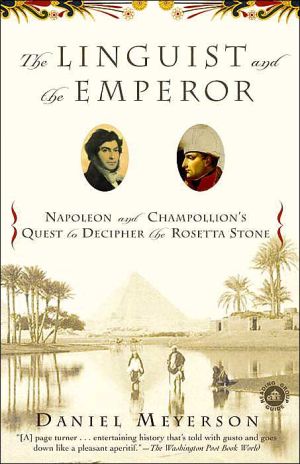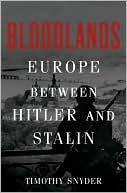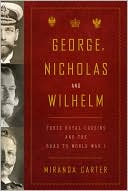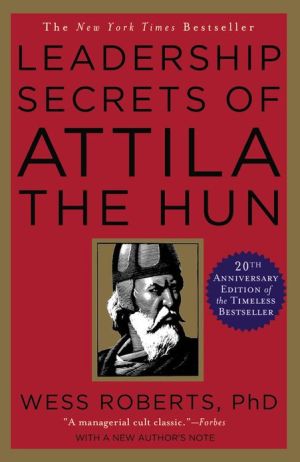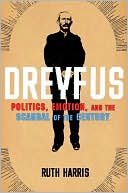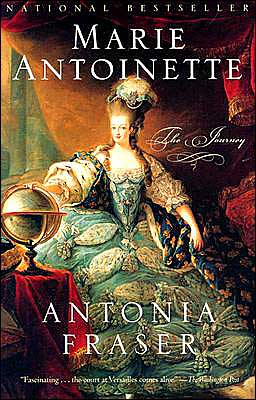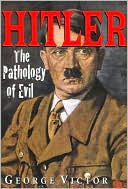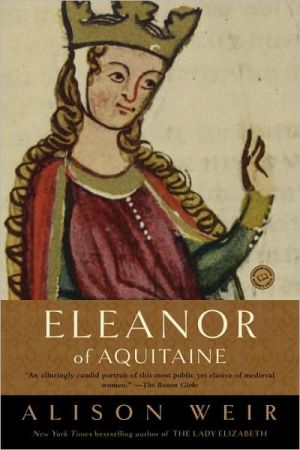The Linguist and the Emperor: Napoleon and Champollion's Quest to Decipher the Rosetta Stone
"The deciphering of the Rosetta stone was one of the great intellectual achievements of all time, unlocking the secrets of thousands of years of Egypt's ancient civilization. Yet in the last two centuries, the circumstances surrounding this bravura feat of translation have become shrouded in myth and mystery. now in his spellbinding new book, Daniel Meyerson recounts the extraordinary true story of how the lives of two geniuses converged in a breakthrough that revolutionized our understanding...
Search in google:
The deciphering of the Rosetta stone was one of the great intellectual achievements of all time, unlocking the secrets of thousands of years of Egypt’s ancient civilization. Yet in the past two centuries, the circumstances surrounding this bravura feat of translation have become shrouded in myth and mystery. Now in his spellbinding book, Daniel Meyerson recounts the extraordinary true story of how the lives of two geniuses–the emperor Napoleon and the linguist Jean-François Champollion–converged in a breakthrough that revolutionized our understanding of the past.In this sweeping narrative, the haunting story of the Rosetta stone–its discovery in a doomed battle, the plot to secure it, the agonizing race to unlock its secrets, and the pain it seemed to inflict on all who touched it–reads like the most engrossing fiction. As counterpoint to the stories of the brilliant linguist and the visionary emperor, Meyerson interweaves the ancient tales of love, intrigue, brutal death, and miraculous rebirth that were hidden for centuries on the walls of Egyptian tombs–stories that Champollion finally made accessible to the world. The Washington Post Here is some entertaining history that's told with gusto and goes down like a pleasant aperitif -- one part Napoleon, another of Champollion, a dash of Josephine and a bit of Lord Nelson. Stir in the elements surrounding the mystery of hieroglyphics, and, voilà, you have Daniel Meyerson's The Linguist and the Emperor. — Kunio Francis Tanabe
Prelude1Ch. 1Ab Ovo - From the Egg9Ch. 2The Awakening31Ch. 3The Promised Land47Ch. 4Two Beginnings71Ch. 5Lions of the Desert92Ch. 6To the Strongest!119Ch. 7Deliciae Alexandriae - The Delights of Alexandria135Ch. 8K[Iota][Upsilon][Eta]162Ch. 9On the Soldier's Neck181Ch. 10Of Linguists and Emperors and Everlasting Fame201Ch. 11The Weight of the World222Ch. 12The Divine Crossword Puzzle242Epilogue266Author's Note269
\ The Washington PostHere is some entertaining history that's told with gusto and goes down like a pleasant aperitif -- one part Napoleon, another of Champollion, a dash of Josephine and a bit of Lord Nelson. Stir in the elements surrounding the mystery of hieroglyphics, and, voilà, you have Daniel Meyerson's The Linguist and the Emperor. — Kunio Francis Tanabe\ \ \ \ \ Publishers WeeklyThis florid adventure tale, presented in colorful episodes that read as if drawn from a Hollywood film treatment, interweaves Napoleon's obsessive empire building with Jean Fran ois Champollion's determined mission to crack the code of hieroglyphics. The story hinges on the long, drawn-out Napoleonic campaign in Egypt (1798-1801), during which the Rosetta stone, which enabled Champollion's breakthrough, was discovered. Meyerson, an Ellis Fellow at Columbia and the author of a previous book on despots, conjures two fanatic visionaries, lingering on Napoleon's insecurities and cruelties and on Champollion's dogged devotion, flashes of passionate intuition and periodic exhaustion. Beginning with an account of Champollion's obscure childhood and experience of the revolutionary Terror, and tracing the prodigy linguist's early interest in ancient languages in the context of narrow-minded lyc e life, the book renders Champollion's adult career as one long struggle to justify his theories. The Napoleonic campaign in Egypt is mined for its colorful generals and scenes of thirst-crazed soldiers, while the history of Egypt and how its ancient language came to be lost is skimmed, with an emphasis on sensuous detail. Overwritten and festooned with continuous anticipations of the various fates and destinies of each of its personages, repeatedly casting Egypt as a mysterious muse or virgin, this romance treats neither history nor linguistics with any degree of seriousness. B&w photos and illus. (Mar.) Copyright 2004 Reed Business Information.\ \ \ Library JournalMeyerson (Ellis Fellow, Columbia Univ.) offers a literary biographical-historical narrative of the deciphering of Egyptian hieroglyphic writing by enigmatic French linguist Jean-Fran ois Champollion. Intended for general readers, the book incorporates the career of Napoleon Bonaparte-in particular his militarily ill-fated yet scientifically successful Egyptian Expedition of 1798-1801, which made possible the discovery of the Rosetta Stone, the key to the entire puzzle. Meyerson cinematically juxtaposes significant events in both men's lives, taking readers unexpectedly back and forth in time to enhance the plot lines. Snippets of ancient Egyptian and Classical texts are included to impart some of the richness of the world that Champollion's achievement made accessible after two millennia. Not a formal history or biography, this work omits references and an index. A final author's note does include some suggested readings for those whose interest has been piqued, but, unfortunately, outmoded works by E.A.W. Budge are touted among them. With little currently available about Champollion, this book will serve as an engaging introduction for public library patrons. (Illustrations not seen.) [Previewed in Prepub Alert, LJ 11/1/03.]-Edward K. Werner, St. Lucie Cty. Lib. Syst., Ft. Pierce, FL Copyright 2004 Reed Business Information.\ \ \ \ \ Kirkus ReviewsA sadly missed opportunity: a tepid account of code-breaking that might have made a fine, lean tale of scholarly detection. Jean-Francois Champollion was the kind of kid who, at the age of seven, knew that he would grow up to decipher the then-unreadable Egyptian hieroglyphs that European adventurers and soldiers were busily carting off to museums and markets back home. Tutored by a linguistically gifted priest who was then on the run from the French Revolution, Champollion mastered one language after another, arguing the merits of classical Persian and Greek thinkers before indifferent country schoolmasters. Napoleon was, well, Napoleon, certain from an early age that it was his destiny to conquer the world and perhaps-shades of Raiders of the Lost Ark-to rule with the aid of knowledge hidden away in the tombs of the pharaohs. "They will sit and talk about Egypt the way two men talk who have loved the same woman," writes Meyerson (Ellis Fellow/Columbia Univ.; Blood and Splendor, not reviewed), apparently possessed by the muse of Danielle Steel. "But not yet"-for Champollion has to get out of grade school, Napoleon into the saddle. In time, though, Napoleon's grenadiers hauled away the Rosetta Stone, a stele that glossed hieroglyphs with Greek phrases, and Champollion set about figuring out what they meant. The process Champollion used is one of the shining moments of linguistic deduction, one that has inspired subsequent generations of students of dead languages from Minoan to Tocharian to Mayan. Meyerson prefers sentiment to science, though ("These letters are not written in Coptic or Arabic or Latin or Greek, but in the language-where can he have learned it, poring over old, mustypapyri night and day as he does?-the language of love"), and anyone seeking insight into Champollion's method, and the significance of his discoveries, will want to go elsewhere-and fast. Tone-deaf and uninteresting. The hieroglyphs, though, are nicely drawn. Agent: Noah Lukeman/Lukeman Literary Management\ \
